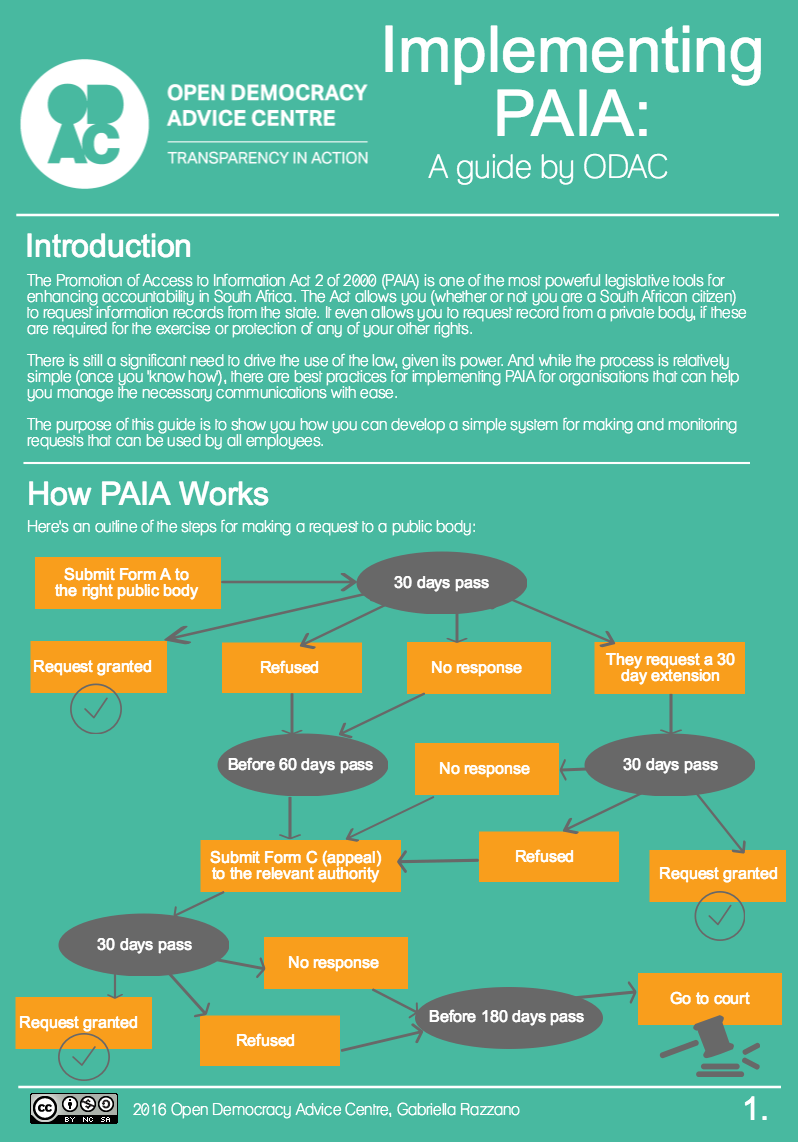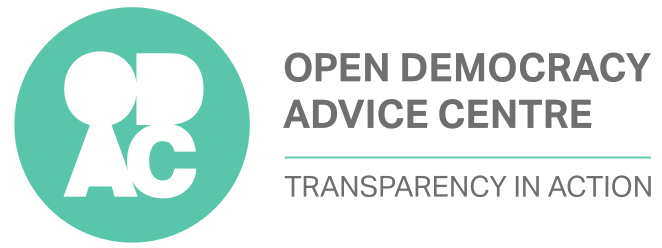Publications
How to Implement PAIA in your organisation

For years ODAC have been promoting the use of the Promotion of Access to Information Act 2 of 2000 (PAIA). This work has involved not only encouraging members of the public to use the Act, but also using it ourselves in the strategic pursuit of transparency. We have accomplished some great successes with PAIA - yet it is only know that we are sharing our best practices on implementing PAIA within your own organisation, to encourage other actors to engage more readily with the Act as well.
Our motivation for doing so is quite straightforward: we believe that, the more departments are forced to engage with PAIA through requests, the more likely it is they will implement systems to deal with PAIA that will eventually lead to more effective and responsive behaviour. The Guide is short and pragmatic - but we hope are brief attempts to outline some best practice will encourage other organisations to engage in an act we believe to be of immense public good.
Download here.
Accessing Information? What we know from user experiences
Download the full report here.
In 2012, the Open Democracy Advice Centre (ODAC) began exploring the possibility of an automated online requesting
process for the Promotion of Access to Information Act 2 of 2000 (PAIA) in South Africa. Adapting the MySociety
technology “Alaveteli”, we pursued the implementation of a solution, but struggled to find any comprehensive reviews
that could provide insight into user experiences of PAIA. To address this, we have undertaken a comprehensive
review of PAIA users and non-users, and in so doing gained invaluable insight into South Africa’s access to information
environment
Access to information is not a reality for most South African citizens. PAIA — the law created to help realise our constitutional right of access to information — is poorly implemented and under-utilised. In 2012, the South African Human Rights Commission (SAHRC) reported that fewer than 15% of audited institutions had specifically budgeted for PAIA implementation and compliance requirements since 2008. This patent reflection of the lack of institutionalisation of the law within government departments was the context in which ODAC first considered automating the process for requesting information (the project was initiated in 2013). That lack of prioritisation is reflected in the state’s subsequent performance in relation to PAIA: in the 2012 reporting period, the PAIA Civil Society Network (of which ODAC is an active member) noted that only 16% of requests resulted in the release of requested information, and more disturbingly, 54% of requests simply remained unanswered.
A Crisis of Accountability
To mark the anniversary of the Snowden revelations, the Open Democracy Advice Centre through the Head of Research, Gabriella Razzano, have taken the opportunity to contribute to a joint publication edited by Simon Davies, and published by The Privacy Surgeon, entitled: "A Crisis of Accountability: A global analysis of the impact of the Snowden revelations".
In light of the Snowden revelations, the report looks at 18 countries, the private sector and the European Union to explore the various facets of the impact his disclosures made on different sectors. ODAC have taken the time to reflect in particular on how the revelations have contributed to change in the perception of whistleblowers in South Africa.
Download the full report here.
Empowering our Whistleblowers
Commissioned by the Right2Know Campaign, in 2013 ODAC did an extensive research investigation of the state of whistleblowing in South Africa. Arising from this research, we have developed the book "Empowering our Whistleblowers", a resource that not only provides insight into the whistleblowing environment, but also highlights lacuna's within the environment, as well as the steps necessary to take the whistleblowing agenda forward in South Africa.
The objective of the publication is to shed some light on what the risks for whistleblowers currently are, and in so doing try and figure out practical and political interventions that will create an enabling environment for whistleblowers to come forward.
The conclusion of the research is a 7-point Whistleblowing Test that can assess our whistleblowing enivornment moving forward. This can be summarised as:
- A Code of Good Practice is established to provide guidance to private and public bodies.
- A civil society whistleblowing network is established.
- Whistleblowers are actively encouraged to come forward through financial, private security, and other, incentives.
- The forums for whistleblowers are effectively implemented.
- All new laws passed support and encourage whistleblowers. Laws are consistent, clear and cohesive.
- Whistleblowers are protected from civil, criminal and administrative liability for legitimate public interest disclosures.
- The Protected Disclosures Act is amended for maximum benefit.
Download the full publication here.
Housing Waiting Lists: Why they don't exist and what you can do about it
ODAC has prepared a summary of an extensive research piece completed by the Community Law Centre and Socio-Economic Rights Institute entitled: 'Jumping the Queue': Waiting Lists and Other Myths: Perceptions and Practice around Housing Demand and Allocations in South Africa.
The report revealed that, in spite of (but perhaps because of) the importance of the right to adequate housing, there is no singular housing waiting list as is commonly believed: instead, housing allocations depend on a variety of factors - outside of a singular list - in order to determine who can benefit from a specific project.
This influences how we should think of housing, but also how we should conduct our housing advocacy.
For more information download the brochure here.
The Status of Access to Information in Africa
In celebration of International Right to Information Day, the Open Democracy Advice Centre, African Platform on Access to Information (APAI) Campaign and Friedrich-Ebert-Stiftung (through fesmedia Africa) launched the release of our research on the state of access to information in Africa. Reviewing fourteen countries, and using the expertise and experience of APAI Working Group Members, the research provides a useful snapshot of the state of access to information on the continent while providing clear and simple summaries and infographics. Through the website at http://www.righttoinfoday.org/ we hope to centralise our awareness-raising around both the APAI Declaration, as well as the call on UNESCO to have Right to information Day officially endorsed on 28 September of every year.

The research comes to a straightforward conclusion: if access to information advocates want to truly forward access to information in Africa, they must work through their research to identify "where the gap is".
Download the full report or you can download the infographic summaries.
The Status of Whistleblowing in South Africa by Patricia Martin
The purpose of this paper is to assess how far South Africa has progressed towards the realisation of a meaningful culture of disclosure. The realisation of a meaningful culture of disclosure requires an enabling whistleblowing legal framework, meaningful implementation and enforcement within all organisations of the practices and protections provided in terms of the enabling laws and a societal culture which is receptive to and respectful of whistleblowers
Click on link to download ODAC Whistleblowing Report (2MB)
